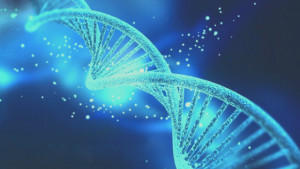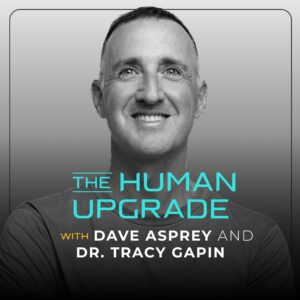
Epigenetics is making a splash in science and healthcare as the medical community is deepening understanding of the link between gene expression and lifestyle factors. Epigenetics is the study of those processes or variables that activate or deactivate the expression of certain genes. These genes make up our entire lives—from the way we look to the way we act to the way our bodies respond to disease.
Epigenetics is showing that we can “turn off” and “turn on” our genes through certain lifestyle variables, like diet, environment, exercise, stress, and sleep. If we have control over the activation of our genes, we may also have control over the way our bodies behave and respond to illness.
What are genes?

To understand epigenetics, we first have to understand the basics of genetics. Our “genes,” or DNA, are what make us who we are. Over 3 billion nucleotide bases that appear in a specific and unique sequence make up our DNA. This sequence of genes provides the cells of the body with information. There are four fundamental types of DNA bases, adenine (A), cytosine (C), guanine (G), and thymine (T).
DNA directs the activity of the cells (which are the fundamental units of human life). The genes tell the cells how to build proteins and how to interact with one another. From hair and eye color to risk for disease and immune response, our DNA controls what we look, act, sound, and live like.
Every person has a unique DNA sequence. Only half of our genetics pass on to our children, while the other half comes from our spouse. No two people have the same genetic makeup—it’s what makes you unique!
But our DNA is just the sequence and this sequence remains unchanged unless afflicted by a rare (and sometimes damaging) mutation.
Our DNA is the instruction manual, but the cells are the builders and doers.
The body’s cells read this sequence. How the cells read the DNA will determine our genetic expression.
Genetic Expression:
Genotype: the genetic makeup or sequence of your cells
Phenotype: the observable characteristics that stem from the genotype
The genotype is the actual sequence of your DNA. The phenotype is how that genotype is manifested in your body in observable traits, like development, physiology, or behavior.
For example, your genotype would be the sequence of DNA bases that determine your eye color. The phenotype is the observable color, like blue.
Eye color doesn’t usually change, but not all genotypes and phenotypes are as cut and dry as eye color. Most DNA genotypes can be read in multiple ways.
The phenotype is the interpretation of the genotype… and there can be multiple interpretations.
Where do the different interpretations come from?
They stem from those parts of the genes that are “turned on” (active) or “turned off” (inactive).
This is where epigenetics comes into play.
What are epigenetics?
Epigenetics looks at how external and lifestyle factors can active or deactivate certain gene expressions.
For decades, we thought that our genetics were our genetics. They were unchangeable—or at least changeable very, very slowly. We thought that mutations in genes took multiple generations to be expressed, and these mutations were usually by random.
Recent years of research is disproving this. We’re finding now that our genes can be modified in our lifetime and then passed down to our children. This means your gene expression can literally be different as a child versus as an adult.
For example, you may not be at risk for cancer as a child but you’re at risk for cancer when you turn 30 because that cancer gene has suddenly been “turned on” from years of exposure to environmental factors, like smoking and pollution.

Factors that affect genes
Epigenetics looks at how certain genes can be silenced (dormant) or expressed (active) over time and what factors influence this. Research is proving that what you eat, where you live, when you sleep, how you exercise, and even with whom you interact can all modify your genes.
Genes don’t just create an order in the womb and stay the same forever. The expression of those genes can change over the course of your life based on your lifestyle and other environmental factors.
Epigenetics doesn’t change the genotype or actual sequence of DNA, but it affects how the cells in the gene are read (the phenotype).
If we could understand exactly which factors turn off and turn on certain genes, we could, in essence, eradicate a number of diseases and cancers.
These changes in genetic expression can occur at any point in your life. They can also occur in previous generations and be passed down through decedents. For example, one study proved the influence of environmental factors on developing infants both in the prenatal and early postnatal stages. In one specific example, children born to mothers who suffered the Dutch famine (1944-145) had increased rates of coronary heart disease and obesity compared to those not exposed to the famine.
Living healthier not only impacts you and your genes. It impacts your children and your children’s children as well.
DNA Methylation
The most studied and understood factor of epigenetics is DNA methylation. DNA methylation controls gene expression. Basically, high methylation turns genes into the “off” position.
Methylation refers to the addition of a methyl (CH3) to the DNA strand. This addition, in essence, turns the DNA strand into the “off” position, as if the methyl addition were flipping a switch.
Whether methylation is a default state or a target on certain genes is still being studied.
DNA methylation is important to ensuring that dangerous sequences of DNA are “turned off.” For example, you want an increase in methylation on sequences that control cancerous cells. In most studies, the genomes in cancer cells are hypomethylated (low in methyls).
Certain lifestyle factors will cause DNA methylation of certain types of cells.
What factors affect health?
Diet, lifestyle choices, stress, and behaviors can all impact the expression of your genes. For example, smoking is proven to mutate your cells and impact the DNA expression of those cells. The chemicals found in cigarettes literally morph your cells, activating the “cancer” genes that were otherwise turned off.

Environment
Your environment directly impacts your health and wellness.
Air pollution especially has a direct link to epigenetics. Studies show that pollution might alter the methyl tags on DNA, which can increase the risk for neurodegenerative disease. Moreover, air pollution can cause or exacerbate asthma, which can be passed down to children.
This pollution also gets into the bloodstream, leading to chronic inflammation in the body. This inflammation has been associated with heart attacks, strokes, cancers, and other diseases.
But changing your environment can also change your genes. Removing yourself from a harmful or polluted environment is the first step. If you need to stay in that environment, regular detoxes and healthy eating is crucial. Certain supplements can also counteract the effects of the environment. For example, B vitamins may protect against epigenetic changes due to pollution.
The environment and air your cells take in has a direct impact on your health and genetic expression.
Diet
What you put into your body also directly feeds into your cells. For example, polyunsaturated fatty acids can promote free radicals and oxidative stress, which can cause your genes to be expressed in a different (mutated) way.
On the other hand, “antioxidants” can help deactivate cancer cell expression. Antioxidants help fight off oxidative damage and free radicals caused by environmental factors like UV ray damage or pollution. Foods like blueberries and kale are known antioxidants.
So, if you undergo some sort of environmental stress, your diet can actually help reverse the damage to your cells.

Some dietary compounds are now accepted to defend against tumors and act as “epigenetic modulators.” These consist of teas, garlic, herbs, grapes, and cruciferous vegetables. For example, one study showed that the diallyl-disulfide in garlic may help minimize colon tumor cells.
Polyphenols are a compound that also impacts an epigenetic expression. Some studies have shown that polyphenols can actually reverse malignant transformation of cancer cells. Soybeans are especially rich in polyphenols that inhibit DNA methylation of cancer cells. In fact, some data suggests that soy consumption is associated with a reduced risk of hormone-related cancers because of the impact of polyphenols on epigenetic expression.
The supplements you add to your diet also have an impact on your cells. Vitamin deficiencies can activate certain cell expressions.
Read: Why You Should Never Eat A High-Protein Diet If You Want To Build Muscle
Keep an eye on the Dr. Gapin blog for more about diet, supplements, and epigenetic expression coming soon!
Drugs & Alcohol
Addiction is hereditary, but how?
There may be a gene for addiction, but the reading or phenotypic expression is what actually manifests in addiction.
This means that addiction can be “turned off” and “turned on.” This is why addicts are often considered addicts “for life”—because it’s in their genes. But it’s also why these “for life” addicts can go 20 years without using.
An addict has the gene for addiction, but certain lifestyle changes can deactivate its manifestation.
Researchers are still studying to see whether genetics creates a predisposing factor to addiction or the expression of the addiction is a response to the use of drugs and alcohols. Ultimately, though, most scientists agree that if you don’t use drugs and alcohol, you are less likely to “turn on” that addiction gene, even if it runs in your family. They also believe that if you are already showing the phenotype (you already have an addiction problem), certain healthy lifestyle changes can deactivate this expression.
Exercise
Some research suggests that exercise can influence gene expression by manipulating the chromatin structure. Basically, exercise can minimize inflammation in the body by impacting DNA methylation. When exercise minimizes chronic inflammation, it helps “turn off” the bad cells and promote good cells.
Other studies have found a link between exercise and genes through the chemical beta-hydroxybutryate (DBHB). DBHB is a ketone that increases the BDNF gene—which is used for healthy production of protein. DBHB builds up in the brain due to exercise, creating an alternative source of energy and “turning on” strong genes in the sequence. It has also been shown to act as a class I HDAC inhibitor in other parts of the body. Basically, exercise increases DBHB, which helps keep the brain and body healthy.

Need more proof? One study had participants bicycle using only with one leg. That leg was obviously more powerful in the muscles, but the cells’ DNA showed an even more interesting finding. Researchers discovered that the genome of those muscle cells had new methylation patterns compared to the unexercised leg. Gene expression noticeably increased in the muscle-cell genes; this can impact energy metabolism, insulin response, and muscle inflammation.
The link of exercise and epigenetics is still being studied, but more and more research is proving that even light or moderate exercise can improve gene expression.
Stress
Your working environment and stress levels can also impact your cells and genetic expression. When we’re stressed, we release hormones called glucocorticoids. These travel throughout the body and impact the hypothalamic-pituitary-adrenal (HPA) axis—which affects the brain, the hormones, and the adrenals. This is what makes you feel physiologically anxious.
Some studies have found that glucocorticoids can actually change DNA expression. Chronic exposure to corticosterone and glucocorticoids actually changes genetic variations, creating a “permanent” state of anxiety or even PTSD.
The reason this happens is interesting—and makes a lot of sense. If you have chronic stress, your body thinks that it’s living in a stressful situation.
Think back to original biological processes. Living in the wild, you’d likely experience chronic stress if you were living in bad weather, in a bear den, or you were low on food. Your body acknowledges that you’re in a stressful situation. So it literally changes its genetic expression so you are more equipped to handle stress. So if you live in a bear cave, you’re likely met with stress on a daily basis. Your body changes so that it becomes more adept at the fight or flight response to meet those daily struggles with the bear.
Now, though, we don’t have this same sort immediate need for fight or flight (on an everyday basis). Thus, it’s not useful or productive for our bodies to genetically express stress.
In fact, this genetic expression of stress can actually “turn off” healthy cells. This leaves room for disease-ridden or cancer-ridden cells to grow, because your body is so focused on the stress response.
Sleep

Studies have shown that sleep can increase DNA methylation levels. This can increase immunity and reduce risk of cancer. Moreover, sleep is necessary for our cells to have time to rest, relax, and rebuild. You need sleep in order for your RNA process to function; RNA methylation determines the speed of your circadian clock.
Basically, studies are finding that an imbalanced or desynchronized circadian clock leads to cancer progression because of the relationship between sleep and DNA methylation.
We’ll discuss this more in upcoming articles in the Epigenetic Series!
Read: 11 Ways To Increase Your Energy After Age 50
Aging
Even how you age can impact your genetic expression. Diseases become more prevalent with age, but why? It’s not because of the number of candles on your birthday cake… it’s because your cells start to change. Some studies are looking at how age can alter DNA methylation and RNA expression. As cells age, the chromatin landscape and DNA accessibility change, which can stop the natural progression of the cell cycle.
But epigenetic mechanisms like changes in lifestyle and environment may actually be able to restore or reverse genetic phenotypes to a more youthful expression.
That’s right—you might be able to reverse the process of aging with epigenetics!
Good news! We will be discussing these environmental factors at length in the Epigenetic Series! Stay tuned with the DRG blog for more info!
The Bottom Line
Epigenetics is showing us that genetic changes happen much faster than we expect. The type of lifestyle and health we choose today doesn’t have some distant, far-off consequences. Our choices impact our near future and the health and wellness of our children.
he way our genes are expressed determines our health and wellness.

Epigenetic factors, like lifestyle habits and environment, influence the way our genetic expression. Certain variables can alter the marks on DNA, determining certain health outcomes.
But if environmental factors can “turn on” the disease and cancer portion of cells… these same factors can “turn off” disease and cancer.
Epigenetics tells us that disease can be reversed with certain lifestyle choices and behaviors.
What if you could make a decision to change one thing about your life and drastically reduce your risk for cancer?
What if you could change one thing and never again worry about the Alzheimer’s or addiction that runs in your family?
In my Epigenetic Series, we will explore the different epigenetic factors that may activate or deactivate cells and certain genetic expressions.
Stay tuned on the DRG blog for more on epigenetic health and wellness! Learn more about how Epigenetics affects YOU with the Peak Launch Discovery Call, a genetic-based report and private consultation that will give you the tools you need to achieve your maximum potential. Sign up now!








